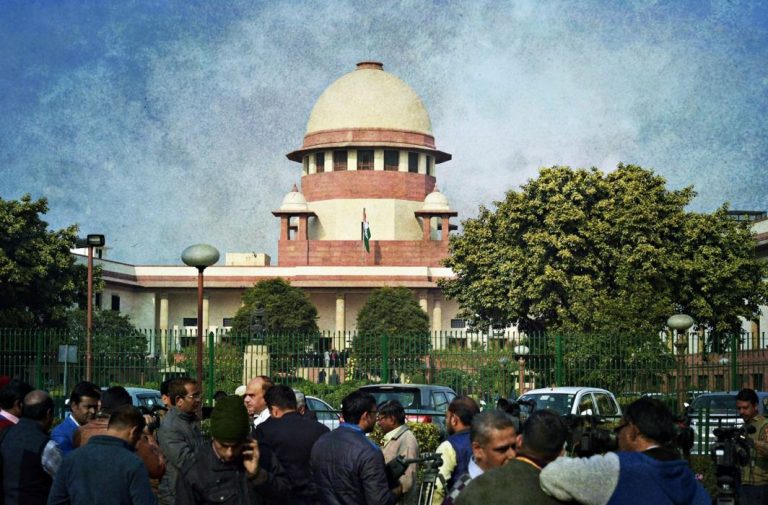
The onus of identification is on the State and not the individual…, insists counsel Gopal Subramanium
Senior Counsel Gopal Subramanium resumed his submissions before the Constitution bench on Wednesday (February 21) in the bunch of petitions challenging the constitutional validity of the Aadhaar (Targeted Deliveries of Financial and Other Subsidies, Benefits and Services) Act of 2016 and its linkages. The bench of Chief Justice Dipak Misra and Justices A K Sikri, A M Khanwilkar, D Y Chandrachud and Ashok Bhushan heard the submissions.
Subramanium urged the bench to link the Jeeja Ghosh vs UoI (2016) verdict on human dignity and the judgment in Subramanian Swamy vs UoI on the right to reputation with the judgment of the nine-judge bench of the Supreme Court in the ‘Right to Privacy’ case.
“Can the State look at the entire society as specie?” the senior advocate asked the bench and added: “The Aadhaar Act has an element of objectification of individuals. The Chief Justice had inquired if it makes a person ‘unperson’. I would say it ‘de-personises’ a person”.
Outlining the principles for determining the validity of state action, Subramanium said: “One, rationality; two, proportionality; and compatibility with domestic law, that is, Articles 14, 19 and 21 of the Constitution… Fundamental Rights have to be afforded an expansive interpretation.”
The senior counsel argued that the Aadhaar Act infringes on fundamental rights as submission of data by citizens for purposes of Aadhaar creation and linkages is not voluntary. “The consequences are not considered, the information is shared with private players, there is no concern about national security, there is no substantive procedure and these violations are not curable,” he said, adding, “If photographs, iris scan and fingerprints are valuable data, their retention is unconstitutional”.
Chief Justice Misra pointed out that “no penal law can be retrospective but its consequences can be.” The senior counsel then submitted that he was going through the doctrinal concept of the Constitution and is trying to scrutinize each section. He submitted that despite earlier court orders, several states imposed mandatory Aadhaar linkages for availing several services following which many petitions were filed. He added: “Aadhaar is being imposed on the people and is intentionally violating our fundamental protection.”
The senior advocate then listed various actions under Aadhaar which infringe on an individual’s right to privacy: “1. Digital lending is possible, 2. It will give rise to enactment of more acts in order to provide protection and 3. If iris and other data are known to the other people, privacy and security will be at stake.”
In response to a query by Justice Sikri, Subramanium submitted: “After the amendment of the Citizenship Act of 1955 in 2003, it was contemplated that citizens in the border areas should be given a smart card or chip for the purpose of establishing identity so that they are not mistaken to be of another nationality. But the idea even behind that was not retention of data.
“A mode of identification must pass the tests of being capable of compliance, least invasive and for which the consent should be natural. But who can think of children being subject to identification for mid-day meals? That a baby should be put on the map before a birth certificate is issued”, he continued.
Referring to the Vyapam scam, Subramanium said: “The scam happened because of the fiddling with computers. So accountability to the State is important. But the State must also respect the dignity of an individual under Article 14.” He remarked that the power of the District Magistrates to administer the 139 notifications issued by the government authorities under section 7 of the Act of 2016 has been ignored.
“To impute that it is the poorest of the poor who have misused the existing proofs of ID is incorrect,” Subramanium said to which Justice Sikri replied: “Let us say that the ‘poorest of the poor’ were the target and it was the intermediaries who siphoned off the benefits by way of ghost ID cards.”
Drawing on the Right to Privacy judgment, the senior advocate said: “In our view, the submission that the right to privacy is an elitist construct which stands apart from the needs and aspirations of the large majority constituting the rest of society is unsustainable… Above all, it must be realised that it is the right to question, the right to scrutinize and the right to dissent which enables an informed citizenry to scrutinize the actions of government…”
Relying on the portion of the judgment the top court had said: “Socio-economic entitlements must yield true benefits to those for whom they are intended… Opacity ensures to the benefit of those who monopolize scarce economic resources,” Subramanium submitted, “‘opacity’ is one of the limbs of Article 14, alongside rationality.
Authentication
The issue of authentication came up again. “There are two types of algorithms – deterministic, like ATM card, and live algorithms. Under the Aadhaar project, there is no consistency as to when Authentication will be demanded and in what manner,” he continued, adding: “The onus of identification is on the State and not the individual…”
Quoting Justice Rohinton Nariman in the 2015 case of Shreya Singhal wherein section 66A of the Information Technology Act of 2002 was struck down, Subramanium said, “Governments can come and go; but the law remains.”
On Justice Chandrachud’s remark regarding the reasonableness of expectation in context of the privacy judgment, Subramanium read out the paragraph of the judgment dealing with the three-fold requirements of a legitimate state interested in imposing restraints on privacy. “There must be existence of a law; the statute must encompass a reasonable objective; and the means to achieve the object must also be reasonable,” he said.
Arguments will continue.
– India Legal Bureau

